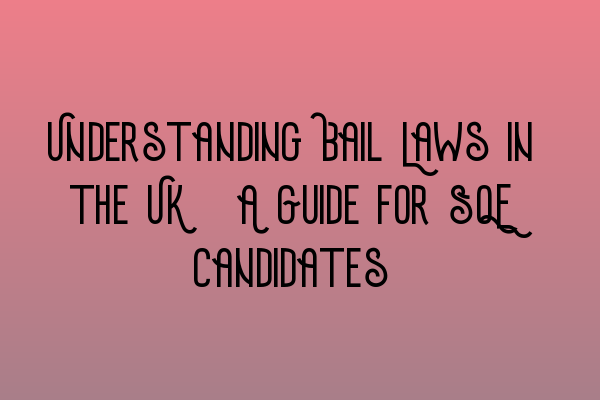Understanding Bail Laws in the UK: A Guide for SQE Candidates
In the field of criminal law, bail plays a crucial role in the administration of justice. As aspiring solicitors preparing for the SQE Criminal Law & Practice examination, it is essential to have a comprehensive understanding of the bail laws in the UK. This guide aims to break down the complexities surrounding bail and provide you with the knowledge you need to excel in this aspect of criminal law.
What is Bail?
Bail refers to the temporary release of an individual who has been arrested or charged with a criminal offense, pending their trial or court appearance. It allows the individual to avoid pretrial detention, provided they comply with certain conditions set by the court.
Key Bail Terminology
Before delving into the intricacies of bail laws, it’s essential to familiarize yourself with some key terms:
1. Bail Application: A formal request made by the defendant to be released on bail, to be considered by the court.
2. Bail Hearing: A court session where the judge or magistrate decides whether to grant bail or not.
3. Surety: A person, typically a family member or friend, who agrees to take responsibility for the defendant while they are on bail. This may include providing financial security or ensuring the defendant complies with bail conditions.
4. Police Bail: When the police release an individual pending further investigation or while awaiting a charging decision.
Types of Bail
In the UK, there are two main types of bail: police bail and court bail.
1. Police Bail: As mentioned earlier, this is when the police release a suspect from custody without charging them, pending further investigation or a charging decision. The police may impose conditions such as reporting to the police station regularly or refraining from contacting certain individuals.
2. Court Bail: This type of bail comes into play when the defendant has been charged with a criminal offense and is brought before the court for a bail hearing. The court will determine whether to grant bail based on various factors, including the seriousness of the offense, the defendant’s previous convictions, and the likelihood of them absconding or interfering with the course of justice.
Factors Considered in Granting Bail
When deciding whether to grant bail, the court takes several factors into account:
1. Risk of Absconding: The court evaluates the likelihood of the defendant not attending their trial if released on bail.
2. Risk of Reoffending: The court assesses the probability of the defendant committing further crimes while on bail.
3. Community Impact: The court considers any potential harm or disruption the defendant’s release may cause to the community.
4. Witness Intimidation: If there is a risk of the defendant intimidating or interfering with witnesses, the court is less likely to grant bail.
5. Sureties: The availability and suitability of sureties play a role in the court’s decision-making process.
Conditions of Bail
Bail conditions are measures imposed by the court to ensure the defendant complies with certain requirements while on bail. These conditions can vary depending on the circumstances of the case but often include:
1. Surrender of Travel Documents: The defendant may be required to surrender their passport or other travel documents to prevent them from leaving the country.
2. Reporting to Police: Regular reporting to the police station may be mandated to keep tabs on the defendant’s whereabouts.
3. Residence Requirement: The court may stipulate that the defendant must reside at a specified address throughout the bail period.
4. Non-Contact Orders: The court may prohibit the defendant from contacting certain individuals or visiting specific places.
The Breach of Bail
Failure to comply with the conditions of bail is a serious offense. If a defendant breaches their bail conditions, they may be arrested and brought back before the court. The consequences of breaching bail can lead to the revocation of bail, imposition of stricter conditions, or even remand in custody pending trial.
Conclusion
A solid grasp of bail laws in the UK is crucial for SQE candidates specializing in criminal law. Understanding the different types of bail, factors considered in granting bail, and the conditions imposed upon release provides a solid foundation for successfully navigating this aspect of the criminal justice system. By familiarizing yourself with the intricacies of bail, you’ll be better equipped to provide legal advice and representation to your future clients, ensuring justice is served.
Remember, this guide serves as a starting point, and it is always recommended to refer to the British legal system and consult relevant statutes and case law for a deeper and more up-to-date understanding of bail laws in the UK.
